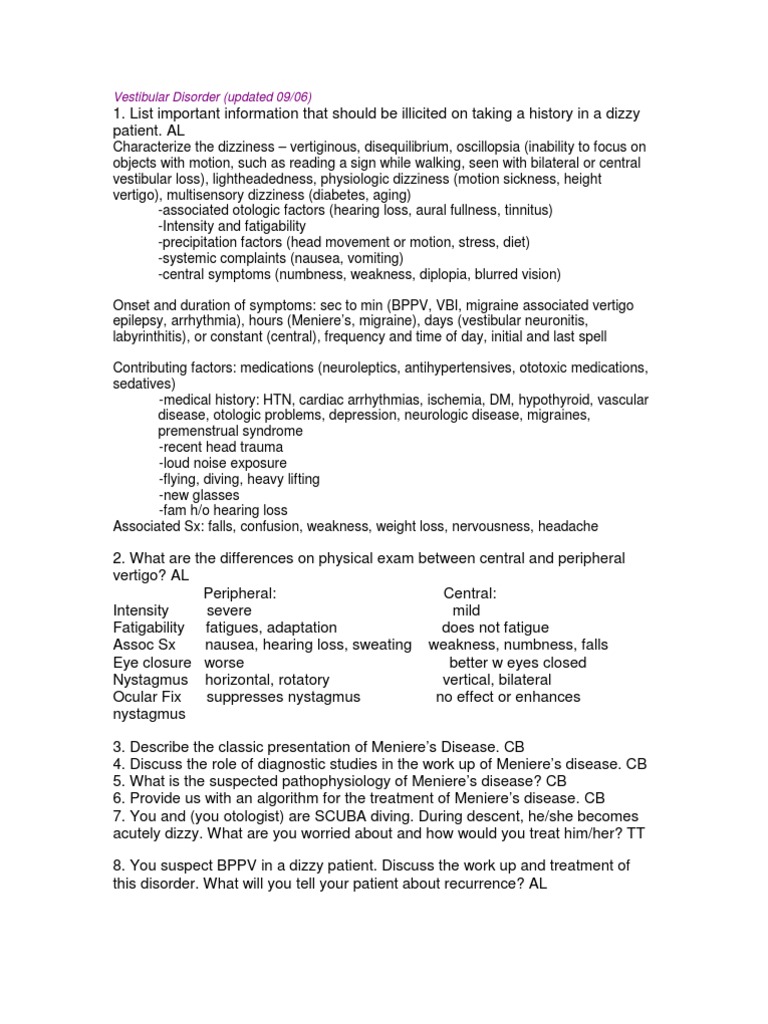Types Of Vertigo Peripheral Central Bppv And More
Vestibular neuritis, stroke, head or neck injuries, and meniere’s disease are all other conditions that can cause vertigo. if you are experiencing vertigo at home, there are several home. See full list on webmd. com. Dizziness and vertigo are two similar feelings with an important difference. because of this, it’s important to avoid using them interchangeably. dizziness is a general feeling of being off-balance.

What Causes Vertigo And Who Is At Risk For It Everyday Health


Non-vertigo dizziness describes a wide range of sensations experienced by the patient. patients may report feeling light headed, weak, unsteady, or motion sickness, unevenness, or restlessness. Benign paroxysmal positional vertigo (bppv) is one of the most common causes of vertigo — the sudden sensation that you're spinning vertigo non vestibular or that the inside of your head is spinning. bppv causes brief episodes of mild to intense dizziness. it is usually triggered by specific changes in your head's position. The most common causes of the inner ear trouble that leads to peripheral vertigo are: benign paroxysmal positional vertigo (bppv). See full list on mayoclinic. org.
Benign Paroxysmal Positional Vertigo Bppv Symptoms And
Only about one-third of the patients presenting with dizziness or vertigo to the emergency department (ed) are diagnosed with a neurotological (vestibular) disease. the differential diagnosis of the most frequent non-vestibular causes of vertigo or dizziness includes vasovagal syncope, drug-related side effects, and dangerous conditions such as cardiac arrhythmia, electrolyte or fluid. Loss of balance. difficulty in balancing, or an inability to walk in a normal manner are both common signs of vertigo. alternately, a patient may simply complain of feeling that they just cannot maintain their balance. imagine a straight li. Vertigo is that unsettled feeling of moving or spinning when you're perfectly still. sometimes a person experiencing vertigo will feel like the room is moving when it actually isn't. dizziness is often a descriptor used for vertigo. read on. Non-vestibular causes of dizziness. dizziness can be linked to a wide array of problems vertigo non vestibular and is commonly linked to blood-flow irregularities from cardiovascular problems. non-vestibular causes of dizziness are listed below.
Vertigo Causes And Symptoms
Non-vestibular causes of dizziness aneurysm: a weak spot in an artery wall that balloons out and allows blood to leak into the vessel walls. an aneurysm is arrhythmia: an irregular or abnormal heartbeat and can result in low blood flow vertigo non vestibular to the brain, causing one to faint or atherosclerosis:.
Benign paroxysmal positional vertigo occurs most often in people age 50 and older, but can occur at any age. bppv is also more common in women than in men. a head injury or any other disorder of the balance organs of your ear may make you more susceptible to bppv. Benign paroxysmal positional vertigo (bppv) is scary because it hits so suddenly and keeps you from doing normal activities. learn why this happens and how to put loose ear crystals back in place. There are other causes of vertigo both in and outside the brain. you can have meniere disease (described below), labyrinthitis (described below), a tumor called an acoustic neuroma or side vertigo non vestibular effects. Get medical attention immediately if you're dizzy and you faint, fall, or can't walk or have any of the following: does it feel like you're spinning or the room is moving around you? that's a classic sign of a particular type of dizziness called vertigo. it's more than feeling off-kilter and usually gets worse when you move your head. this is a symptom that there is an issue in the inner ear or part of the brainstem governing balance. the most common kind is benign paroxysmal positional vertigo, or bppv.
Live a healthy lifestyle! subscribe to our free newsletters to receive latest health news and alerts to your email inbox. Feb 25, 2021 · dizziness and vertigo are two similar feelings with an important difference. because of this, it’s important to avoid using them interchangeably. dizziness is a general feeling of being off-balance. Vertigo is the sense that you or your environment are moving or spinning in circles. it's vertigo non vestibular considered to be one type of dizziness. it has been described as feeling like the world is spinning around you. one way to imagine vertigo is the sens.
The signs and symptoms of benign paroxysmal positional vertigo (bppv) may include: 1. dizziness 2. a sense that you or your surroundings are spinning or moving (vertigo) 3. a loss of balance or unsteadiness 4. nausea 5. vomiting the signs and symptoms of bppv can come and go and commonly last less than one minute. episodes of bppvcan disappear for some time and then recur. activities that bring about the signs and symptoms of bppvcan vary from person to person, but are almost always brought on by a change in head position. some people also feel out of balance when standing or walking. abnormal rhythmic eye movements usually accompany the symptoms of benign paroxysmal positional vertigo. People with a vestibular disorder may also experience dizziness due to other causes. below is a list of some of the possible non-vestibular causes of dizziness. if you are experiencing symptoms of dizziness it is important to see a qualified health professional to find out the cause of your symptoms and for advice, treatment and referral to a specialist if necessary. Vertigo is the sensation that an individual or the world around him is spinning. doctors divide vertigo into two categories: peripheral vertigo and central vertigo is rarer and is usually caused by damage to the central nervous system. vert. Canalith repositioning is very effective for people with benign paroxysmal positional vertigo (bppv) — the most common cause of vertigo. results vary, but some studies have shown between a 50.
Posting Komentar untuk "Vertigo Non Vestibular"